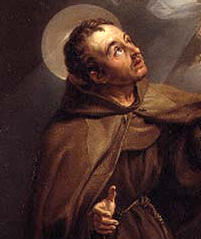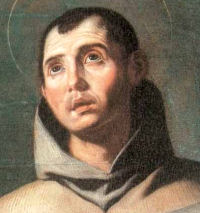Easter: May 17th
Friday of the Seventh Week of Easter
Other Commemorations: St. Paschal Baylon, Religious (RM)
» Enjoy our Liturgical Seasons series of e-books!
The Roman Martyrology commemorates St. Paschal Baylon (1540-1592), who lived and died in the kingdom of Aragon, Spain. He spent his early years as a shepherd and often gave religious instruction to the shepherds on the hills of Aragon. At the age of twenty-four, he entered the Franciscan Order and embraced the humble, austere life of a lay brother. He was noted for his devotion to the Holy Eucharist. Pope Leo XIII declared him protector of all Eucharistic Congresses and works.
>>>Continue praying the Pentecost Novena to the Holy Spirit.<<<
Meditation for Friday of the Seventh Week of Easter:
Christ Jesus has opened Heaven to us: Prayer of Thanksgiving
On the day of His Ascension, Christ, the supreme High Priest of the human race, took us with Him into heaven, by right and in hope.
Never forget that it is only by Him that we can enter there; no man can enter into the Holy of holies except with Him; no creature can enjoy eternal bliss except by following Jesus; it was His merits that won for us infinite beatitude. Throughout eternity we shall say to Him: O Christ Jesus, it is through You, through Your Blood shed for us, that we are before the Face of God; it is Your sacrifice, Your immolation, that has gained for us each instant of our glory and beatitude: to You, O Lamb slain for us, be all honour, all praise, all thanksgiving!
Let us have absolute confidence in the sacrifice, the merits and the prayer of our High Priest. He has entered today into the heavens; He inaugurates, with His triumph, His unceasing mediation; He is the beloved Son in Whom the Father is well pleased; how can He fail to be heard, after having manifested by His Sacrifice such love to His Father?
—Dom Columba Marmion, Christ in His Mysteries, p. 319
St. Paschal Baylon
 Paschal Baylon (named after the day of his birth and death: Pentecost Sunday—Pascha Pentekostes) was a simple, pious shepherd boy who later became an ardent spiritual son of St. Francis and the heavenly patron of adorers of the Most Blessed Sacrament. He belongs to that illustrious circle of saints who, by heroic holiness of life, refurbished the Church's crown that had been desecrated by the heretics of the sixteenth century. He hailed from the Spanish section of Valencia in the year 1540, and died at the age of 52. As he lay dead upon the bier, he opened and closed his eyes twice when the sacred species were elevated at the consecration. Leo XIII declared him the heavenly patron of all Eucharistic leagues and societies.
Paschal Baylon (named after the day of his birth and death: Pentecost Sunday—Pascha Pentekostes) was a simple, pious shepherd boy who later became an ardent spiritual son of St. Francis and the heavenly patron of adorers of the Most Blessed Sacrament. He belongs to that illustrious circle of saints who, by heroic holiness of life, refurbished the Church's crown that had been desecrated by the heretics of the sixteenth century. He hailed from the Spanish section of Valencia in the year 1540, and died at the age of 52. As he lay dead upon the bier, he opened and closed his eyes twice when the sacred species were elevated at the consecration. Leo XIII declared him the heavenly patron of all Eucharistic leagues and societies.
One day Paschal heard the bells of a convent announce the approaching consecration at Mass. Such an ardent longing for God overcame him that, prompted by yearning and love, he involuntarily cried out: "O God, most worthy of all adoration, please let me see You!" Hardly had he uttered the prayer when a glowing star appeared in the sky. As he watched, the heavens opened; the star disappeared and was replaced by a chalice with the Host, flanked by two adoring angels. Christian art has selected this vision to show his chief virtue, viz., love for the most holy Eucharist.
—Excerpted from The Church's Year of Grace, Pius Parsch
Patronage: cooks; shepherds; male children; Eucharistic congresses and organizations (proclaimed 28 November 1897); priestly vocation; Bisenti, Italy; Castelnuovo, Assisi, Italy; Montebello, Orciano di Pesaro, Italy; Obado, Bulacan, Philippines; diocese of Segorbe-Castellón de la Plana, Spain
Symbols and Representation: In adoration before a vision of the Host; Monstrance; Franciscan habit; Before the Eucharist
Highlights and Things to Do:
- Read more about St. Paschal:
- Tomie de Paola wrote a children's book Pascual and the Kitchen Angels that retells some of the goings on in the kitchen with St. Pascal.
- St. Paschal's tomb is located in Sanctuary of St. Paschal Baylon, or de Sant Pasqual, popularly known as El Sant in Villarreal, Spain.








